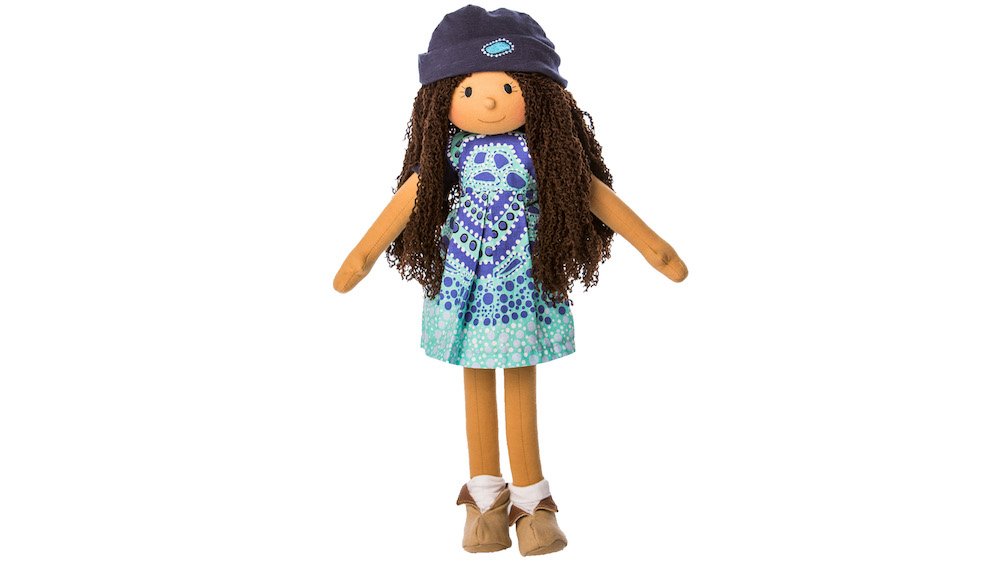Australian preschool television program Play School has this week broadcast an ‘Acknowledgment to Country’ special in honor of Indigenous culture — and it may just be the most noteworthy episode in the program’s 53-year installment.
The episode coincides with NAIDOC Week, which commemorates the culture, history, and accomplishments of Australia’s First People. Alongside an all-Indigenous cast for the first time, the episode saw the introduction of a new Indigenous doll named Kiya.
Kiya — who was introduced by hosts Miranda Tapsell, Luke Carroll, and Hunter-Page Lockhart — belongs to the Noongar people, who traditionally live in the south-west corner of Western Australia. She wears a dress which represents the connection between Noongar people and the ocean and is named after a standard Noongar greeting.
Kiya will become a regular cast member, joining beloved characters like Jemima, Humpty, Big Ted, and Little Ted.
Today is Kiya’s first day at Play School!
— ABC Indigenous (@ABCIndigenous) July 7, 2019
The history making episode marks #NAIDOC2019 and will be the first time #PlaySchool will have a line up of all Indigenous presenters with a whole episode of Indigenous content, also a first for Play School!
Join us from 9am on ABC Kids. pic.twitter.com/snzDxJTAE1
Jessica Staines, an Aboriginal early childhood consultant and script advisor for the Play School episode, told Global Citizen the impact of a permanent Indigenous doll on the program should not be understated.
"It’s important for all children to see themselves reflected in the world around them,” she stated. “Having an Aboriginal toy cast member instills a sense of pride in young children’s emerging identity.”
Staines further explained the importance of representing just how multifaceted the broader Aboriginal community is.
"Kiya is not the first Aboriginal toy cast member on Play School and will be joining veteran Aboriginal male doll, Dan. Unlike Kiya, Dan doesn’t have a specific mob or nation. I personally feel like this is similar to a lot of Aboriginal people who have been displaced from their communities,” Staines explained. “It was important for Kiya to be different to Dan, allowing Play School to be reflective of the diverse identities of Aboriginal people.”

Beyond celebrating Indigenous culture, Tapsell — an actress and two time Logie Award Winner — told the Guardian that seeing Indigenous art like Kiya on television would enable future generations to “grow up and have a more advanced conversation around Australia's relationship with Aboriginal people and Torres Strait Islanders."
"While I understand that art doesn’t fix the bigger problems — it doesn’t change policy, it doesn’t change the law — if we’re going to have an advanced conversation around Aboriginality, we need to use art to put a spotlight on having those bigger conversations. And that’s what I believe Kiya will do,” she said. “There’s a huge gap in health and education, incarceration rates are through the roof, but there’s not one way to tell an Aboriginal story.”
Loving Play School this morning. It’s been a while since the kids were young enough to watch regularly but we’re all here this morning to meet Kiya. So wonderful to see this special episode and celebrate culture and NAIDOC Week. #Kiya#PlaySchool
— Amy Perry (@gorgeouspalaces) July 7, 2019
Aboriginal and Torres Strait Islanders account for 27% of the nation’s incarceration rate — despite representing just 2.8% of Australia’s population. Indigenous Australians also have an employment rate of 47%, compared with 72% for non-Indigenous citizens.
Out of 151 people, there are just five Indigenous Australians in the current Australian parliament.
The historic Play School episode, which also features a hip-hop cover of ‘Hickory Dickiry Dock’ by Australian musician Baker Boy, will be streamed the following two weekends of July on ABC KIDS and can be watched online here.